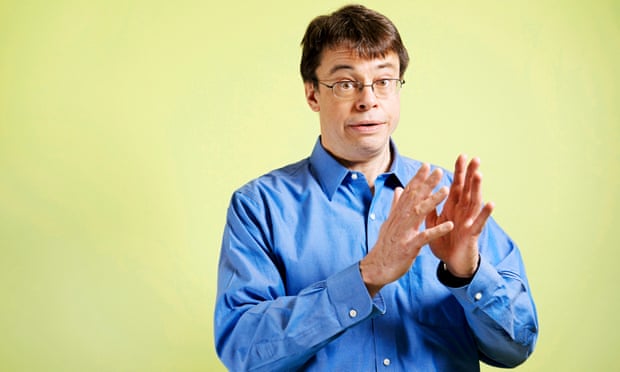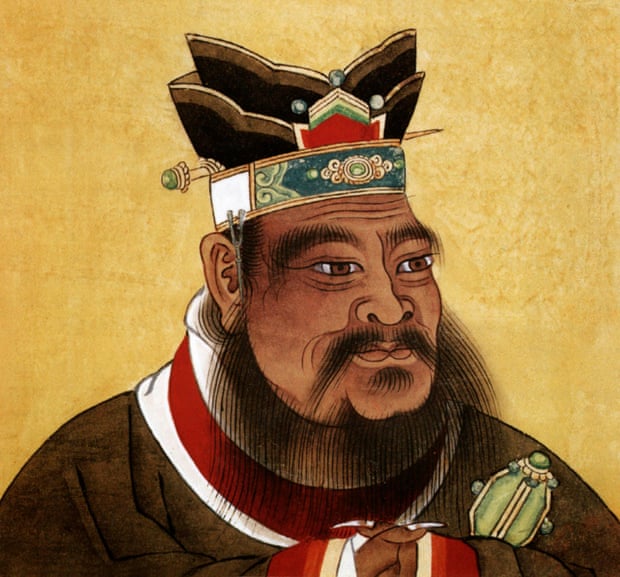Source: The Guardian (3/26/17)
Can Harvard’s most popular professor (and Confucius) radically change your life?
Michael Puett’s book The Path draws on the 2,500-year-old insights of Chinese philosophers. He explains how ‘straightening your mat’ can help you break out of the patterns that are holding you back
By Tim Dowling

Professor Michael Puett: what we really are is ‘a messy and potentially ugly bunch of stuff’. Photograph: Linda Nylind for the Guardian
The School of Life’s Sunday sermons could be described as lectures for people who don’t believe in God but still like church. They sing secular songs before and after the sermon (when I arrive, the large congregation at Mary Ward House in London is on the second verse of A Spoonful of Sugar), and everybody seems to share an abiding faith in the power of open-mindedness.
On this particular Sunday, the sermon is to be delivered by Michael Puett, professor of Chinese history at Harvard University, and is based on his book The Path, which applies the lessons of ancient Chinese philosophers to modern life. These philosophers may have done their best work 2,500 years ago, but they were trying to answer the same big questions we still ask. How do I live my life? How do I live my life well?
“I forewarn you,” Puett tells the congregation: “At first it’s gonna sound really bleak.”
The back cover of The Path describes Puett as “Harvard’s most popular professor”. It is unclear how this distinction is awarded, but the book grew out of a 2013 magazine article written by his co-author, Christine Gross-Loh, about the undergraduate course Puett teaches – classical Chinese ethical and political theory – said to be the third most popular class at Harvard.
“That’s still the case,” Puett says when I meet him. “No 1 and No 2 are the introduction to economics class and the introduction to computer science class.” Third biggest means his lectures are delivered to around 750 students. Puett exposes them to the writings of Confucius, Mencius, Zhuangzi and Xunzi, among others, but he also promises that the course will do more than just fulfil Harvard’s required ethical reasoning module.
“I do give them a guarantee,” he says. “The guarantee I make is if they take these ideas seriously, by the end of the course, these ideas will have changed their lives.”
When he speaks publicly, Puett’s voice ranges between a low rumble and an enthusiastic squeak. At first it sounds almost muppet-like, but after a while it becomes a little incantatory – you can see why he is a popular lecturer. He doesn’t refer to notes, and he has no visual aids. His sermon, like his course, begins by shattering some commonly held preconceptions about the self: there is no self, he says. The idea that we should look within, discover our true nature and act accordingly is, according to Confucius, nonsense. What we really are, Puett says, is “a messy and potentially ugly bunch of stuff”, a collection of emotions and conditioned responses, with no guiding inner core. We think we are self-determined, but in reality we are so set in our patterns that Google exploits our predictability to sell us stuff without us noticing.
Puett’s School of Life audience is very open to this notion – I think most of us already figured as much – but apparently when he tells this to his students, it blows their minds. Is this, I wonder, a generational thing?
“Yes, I think it is very generational,” he says. “This is a generation that was raised being told: ‘Your goal is to look within. Find your true self, especially during these four years of college.’ And furthermore the argument is, once you do find yourself, try and be sincere and authentic to who you really are, and then decide your career according to who you are.”
Once they get over the shock, however, his students are immensely receptive to Chinese philosophy’s counterintuitive model. “Because they’ve spent 20 years looking for this true self and not finding it.”
The Path is in part a pleasing debunking of fashionable self-help disciplines – there are no quick fixes; improvement is incremental at best, and a lifetime of work. “I think of it as sort of anti-self-help,” says Puett. “Self-help tends to be about learning to love yourself and embrace yourself for who you are. A lot of these ideas are saying precisely the opposite – no, you overcome the self, you break the self. You should not be happy with who you are.”
While Puett’s students are obliged to get to grips with the primary sources, The Path was written for people mostly unfamiliar with the history of eastern thought. It is no simple matter to create a modern-day guide to living – boiled down to 200 pages – from writings that are often ambiguous, if not downright gnomic. In The Analects, a collection of the teachings and thoughts of Confucius compiled by his followers after his death, one typical passage reads: “He would not sit until he had straightened his mat.” You could draw a lot of contradictory conclusions from that.
Puett is also aware that there is some risk in extracting an overarching message from a number of different philosophers who often disagreed with one another.
“They do share a generally common vision of human psychology,” he says. “That we have a tendency to fall into patterns and ruts in our existences.” The Confucian strategy for disrupting these patterns was the judicious observance of ritual – coded behaviours that force people to operate outside their normal roles. This has often been misunderstood as a call for conformity and a slavish adherence to tradition, but, according to Puett, Confucius meant no such thing. “For Confucius,” he writes, “the ritual was essential because of what it did for the people performing it.”

Confucius, who apparently ‘would not sit until he had straightened his mat’. Photograph: Apic/Getty Images
Clearly there is a limit to the benefit a 21st-century human can derive from a ritual such as, say, ancestor worship. To apply the idea to one’s own life, Puett suggests “slightly altering how you interact with people” – saying something different to the bus driver or the man at the shop’s till every morning, thereby disrupting the patterns that comprise your daily life. I put to him the possibility that you might merely freak out the bus driver.
“Part of what [the philosophers] are getting at is that it’s the break that really matters,” Puett says. “You may say it in a way that’s actually very offputting to the driver, but you’ll be better at sensing that, and therefore altering it, if it isn’t just a rote way of talking.” By gauging the change you effect, you can teach yourself to become more emotionally intelligent about your dealings with other humans.
If this technique doesn’t sound wholly alien, it is probably because modern psychology shares some of its strategies. The therapist’s room, Puett argues, is a kind of ritual space, where you shed your normal self for a while, and talk about things from a different perspective.
Puett studied western thought almost exclusively at university. He had been reading eastern philosophers on the side since high school, but it wasn’t until he began a master’s degree that he decided to learn Chinese in order to pursue it exclusively. Did it change his life the way he promises his students it will?
“I’m sure I have a long way to go, to put it mildly,” he says. “But yes, I would say I am a radically different person.”
I can testify that Puett is one of the nicest people – if not the nicest person – I have ever interviewed: attentive, generous and patient. He seems unutterably pleased to be where he is – drinking coffee with a journalist in the noisy atrium of a building in King’s Cross – and he is a font of positive reinforcement. All my questions are great, and my every summary, surmise and speculation meets his approval: “Exactly!” “Precisely!” “A perfect example!” By the end I feel hugely intelligent, which is weird, because when I later listen to the recording of our conversation, I sound far from it.
Confucius developed his ideas against a backdrop of political upheaval – the last great bronze-age dynasty, the Zhou, was in decline, and old certainties had dissolved. Confucius decided to concentrate on teaching the next generation, in the hope that they could make a better world. I ask Puett if he believes we have reached a comparable cultural crossroads.
“I’m sure that every generation feels that way,” he says. “That being said, with this generation, it really is the case.” He and I, he points out, come from a generation that “thought the big wars over isms – socialism, communism, liberalism – were over, and a vision had won that was kind of right.” The generation below – his students – feels betrayed by us, and quite rightly. “Suddenly, they’re realising that we were horribly wrong.”
So, what are we supposed to be doing now? Straightening our mats?
“In a weird way the answer is kind of yes,” says Puett. “What you’re trying to do is train yourself to become incredibly good at dealing with this capricious world.”
At the end of his Sunday sermon, Puett takes questions from the congregation. At one point, a man in my row raises his hand. “If people are just an assembly of patterns,” he asks, “what does it mean to love someone?” In a way, it seems the bleakest moment of the hour, but Puett is beaming.
“Great question!” he says.
• The Path: A New Way to Think About Everything by Michael Puett and Christine Gross-Loh is out now in paperback.